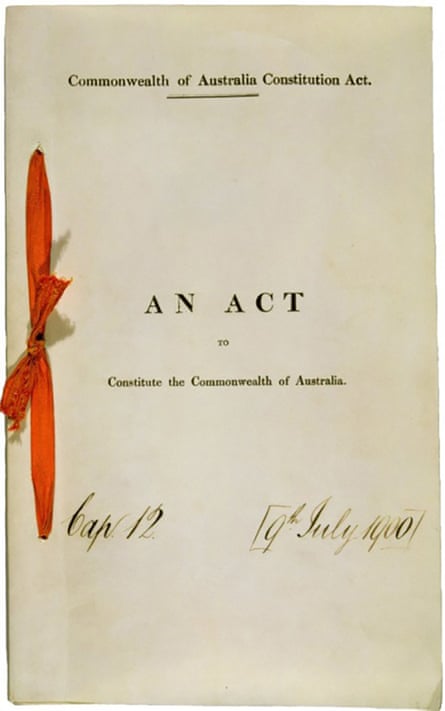Extract from The Guardian

Three colonial politicians – Charles Kingston (left), Alfred Deakin (centre) and Edmund Barton – were appointed as commissioners to deliver the first Australian constitution.
Australia’s founding document was written by fallible, admirable men, limited by the unexamined prejudices of their time.
First up, three colonial politicians had to be appointed as commissioners to negotiate the passage of the constitution through the British Houses of Parliament – that is one further interesting wrinkle: that our constitution needed to be an act of British parliament! These notable men were sent to London to midwife the Federation Act through the British Houses. One was Edmund Barton from New South Wales, a man besotted with cricket, a, magnetic but lazy lawyer whose nickname, “Toby”, was, despite his brilliance, frequently combined with “Tosspot”. He was always in debt and needed the job as a commissioner. He was, as you see, a man admired but hardly the God of the Old Testament.
A second was Alfred Deakin, a far more godly fellow, a remarkable soul who saw the workings of God – even and especially in politics. He was fascinated by Hindu mysticism yet intended that by one of the first acts of the new Australian parliament people like that should nonetheless be prevented from residing in Australia. The commissioners’ – and most white folks’ – views of race at that time were mistaken and were out of date by the second world war.

The third commissioner, Charles Kingston of South Australia, had while premier of that state been bound over and restrained by officers of law from fighting a duel. He had also shocked polite Adelaide by adopting one of his illegitimate children, of whom he was believed to have fathered six.
The three now had a fight on their hands. British ministers, from Joseph Chamberlain, secretary of state for the colonies, to Arthur Balfour in the Foreign Office were uneasy about the constitution, beginning with the term “commonwealth of Australia”, which seemed socialist, and too reminiscent of both Cromwell and the Americans, who had similarly tended to call their older states “commonwealths”.
In any case the three Australians took to the business bravely. This constitution had already been approved by a divided Australian electorate and they did not want to alienate them further by visiting that question again. As well as that, further delays might dissuade Western Australia, who had not yet had their vote or agreed to join the commonwealth, from joining the federation at all.
To have the constitution accepted then, the three now began working directly with sympathetic members of the British parliament, were invited to country houses and met lords and ministers. They were in their ways three obviously talented men, men of merit rather than of an aristocracy, and they acquired the reputation for being “jolly chaps”. At the end of each visit they left parliamentarians anxious to make things work for them.
British admirers of the three men began to lean on Balfour and persuade him not to be pettifogging about the dear Australians, and all this helped the Australian Commonwealth Act be accepted by parliament with a few minor adjustments. There was a reason we wanted Britain’s good will. As a new nation we would have only had state military forces to call on. And there would be no navy at a time when at the far end of the Pacific, the Japanese had one of the handful of most powerful navies on earth.What awaits us is a choice between the outdated racial delusions of 1900 and what we know of 2023.
Such was the time in which the constitution was written by fallible, admirable men, limited by the unexamined prejudices of their age. They were men who would grace the federal parliament with the franchise for women but also mar it with the absurd prejudices of the day. They did what they could but they knew it to be incomplete, and that’s why they put into the document the means for us to alter it.
Section 25 of the constitution – as those three men and their fellow framed it – states that “if by the law of any State all persons of any race are disqualified from voting at elections for the more numerous house of the parliament of the state, then, in reckoning the number of people of the state or the commonwealth, persons of that race resident in that state shall not be counted.” This appalling clause, to tell the truth, was partly a sop to states like South Australia, exempting them from paying for the new federal government per head of Aboriginal inhabitant, and was influenced too by the then uncriticised view that Indigenous Australians would die out as a race. Yet it now reads like something belonging to another planet, not just another polity: the total denial of political attention to an entire race.
So the question is not how dare we alter the constitution, but how dare we not? What sort of people are we if we don’t amend it in terms of what has happened since 1900? For those men lacked infallibility and so did their constitution. It is not an exaggeration to say that what awaits us is a choice between the outdated racial delusions of 1900 and what we know of 2023.
May I draw attention to a geriatric rap I have put on YouTube, entitled “Don’t Go Saying No.” It is a plea to my demographic and a once-off. One has no career in the “rap” artform when you’re not sure whether your shakes are due to the innate vibe or to old age.
Thomas Keneally is a novelist. He is the author of more than 40 books, including the Booker prize-winning novel Schindler’s Ark
No comments:
Post a Comment